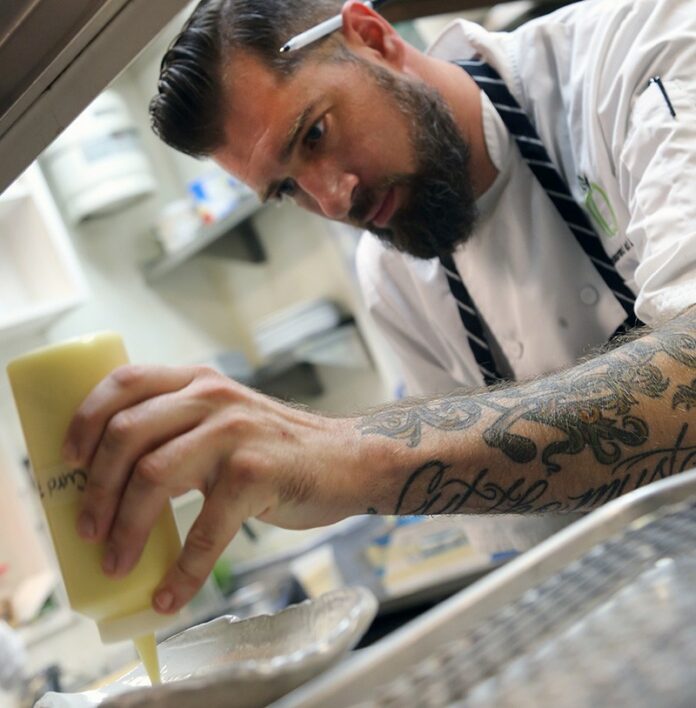Chef Jamil Peden, bearded and tattooed, thoughtful and soft-spoken, walks me through the garden at the Applewood Inn & Restaurant in Guerneville.
“Every day I walk through the garden, and I touch everything and I observe it,” he says. “I try to feel the earth a little bit.”
In addition to raised beds with herbs right outside the kitchen, the restaurant has a small orchard with fig trees, Gravenstein apples, pluots, Mirabelle plums and quince, all at Peden’s fingertips. The verdant garden is dotted with strawberries, cucumbers, heirloom tomatoes, tomatillos, summer squash, peppers and corn. A flock of hens provide the eggs, and eight beehives, the honey. Ultimately, Peden wants 70 percent of his produce grown on-site.
After working at Woodfour Brewing in Sebastopol as chef and general manager, Peden landed the executive chef job at Applewood three months ago. The restaurant and inn is tucked into the redwoods a mile outside of downtown Guerneville.
Applewood, which once held a Michelin star, had grown stagnant. Peden wants to remake it into a dining destination. “I want that star,” he says with a smile. “It’s something that I really believe is just going to take time, and I want to do it my way.”
That starts with great ingredients, but what matters more is what Peden does with them. His favorite dish on the menu right now is quinoa with green beans dressed in Champagne vinaigrette, fried quinoa-crusted avocado, dashi-poached carrots, lacto-fermented carrots and cilantro blossoms. Each component requires a different cooking method, resulting in a cohesive variety of textures and flavors.
Most of Peden’s dishes include a fermented element, a smoked element and a colorful array of vegetables. His plating style is modern. He uses the whole space of the plate, and he mixes it up plate-to-plate.
“Before it goes to the plate, I think we should earn our salaries,” Peden says. “Anybody can go to the farmers market and pick the same beets. But do we roast them at the proper temperature for the right amount of time? Do we compress it afterwards to really solidify the sugars and flavors? Do we dress it properly? Do we dice it perfectly?”
His work ethic and attention to detail are embodied in a tattoo on his forearm that reads “Cut the Mustard.” The tattoo has two meanings. On the literal side, Peden says, it reminds him of how much skill it takes to cut through a mustard seed, and, figuratively, it reminds him to strive to exceed expectations.
Peden was raised on the Oregon coast on a vegan diet. After a period of time resenting his parents’ decision to control what he ate, he came to see the positives. “It makes me very comfortable cooking for anybody’s needs,” he says.
Peden started cooking at 17, and earned his chops in restaurants in Seattle, Santa Cruz and Las Vegas. When he was working as Wolfgang Puck’s sous chef in Vegas, he noticed that a lot of the produce was grown in Sonoma County, so he moved to the source.
As we talk in the kitchen, Peden effortlessly fillets fish, helps complete an order and directs the waitstaff. He keeps his cooks laughing and relaxed.
In a style he calls “interpretive American,” Peden pulls from Japanese, Nordic, Italian and French cuisine. His most important food philosophy is “Don’t fuck it up”—meaning, treat the ingredients with respect, and listen to the seasons.
A refreshing chilled buttermilk soup with cucumbers, fennel, edible flowers and sweet balls of bee pollen reflects the Nordic and Southern influences in his cooking. The rich sourness of the buttermilk plays well with the fennel and honey-like bee pollen.
Peden’s creative mind is never satisfied, and he likes to keep up with the work of other chefs. “On Instagram,” he says, “I follow a lot of chefs that I’ll probably never meet, never actually taste their food, but I get a lot out of the presentations. One of my favorite things to do is go to [San Francisco] and visit different restaurants for dinner.”
By keeping up with the trends of the culinary world, Peden stays away from those he doesn’t like or that are too pricey. “I don’t have lobster on the menu, I don’t have foie gras on the menu,” he says. “That’s not me at all.”
When a guest orders the tasting menu, Peden utilizes his three years of serving experience and brings the plate out to the dining room to explain the dishes. He wants to elevate ubiquitous farm-to-table cuisine to something it hasn’t reached in Sonoma County.
“The thing that gives me the chills, that makes me the happiest, is when a guest tells me that I brought back a childhood memory,” Peden says.









